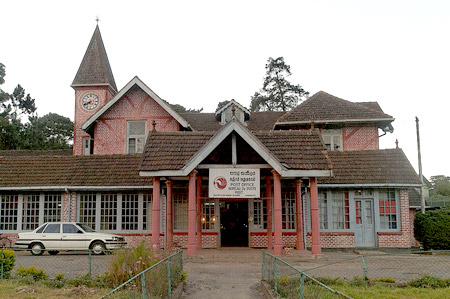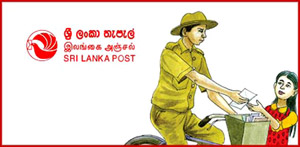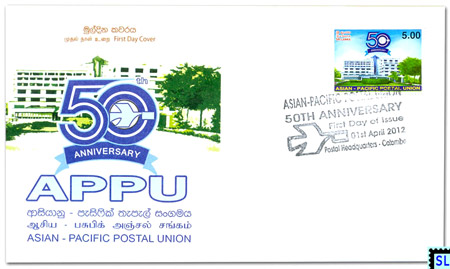|
Strengthening regional postal services:
Platform for international business opportunities - Hemasiri
Fernando
By Naalir Jamaldeen
The Postal Services Ministry and the Postal Department is ready to
hold the Asia-Pacific Postal Union (APPU) Executive Council Meeting (ECM)
from September 15 to 19 in Colombo. Holding the APPU ECM in Sri Lanka
will be a turning point in the history of the Postal Service in Sri
Lanka. Approximately 150 foreign representatives and a group of
representatives including the Director General of the Universal Postal
Union will participate in the ECM. President Mahinda Rajapaksa will be
the Chief Guest at the inaugural ceremony, Secretary of the Postal
Services Ministry Hemasiri Fernando said in an interview with the Sunday
Observer.
 The
Asian Pacific Postal Union (APPU) plays a pivotal role in improving
postal relations between member countries and promoting cooperation
between them. The APPU consists of three bodies such as the Congress,
Executive Council and the Bureau. The Congress is the supreme body of
the Union and is a composed of representatives from member countries.
The Executive Council (EC) comprises all the member countries of APPU.
The Executive Council meets once a year, in one of the member countries
of APPU, Fernando said. The
Asian Pacific Postal Union (APPU) plays a pivotal role in improving
postal relations between member countries and promoting cooperation
between them. The APPU consists of three bodies such as the Congress,
Executive Council and the Bureau. The Congress is the supreme body of
the Union and is a composed of representatives from member countries.
The Executive Council (EC) comprises all the member countries of APPU.
The Executive Council meets once a year, in one of the member countries
of APPU, Fernando said.
Sri Lanka has been benefiting from APPU since 1970. Hundreds of
Postal Department employees received opportunities to undergo training
in the Asia Pacific Postal College (APPC). By assuming the Chairmanship
of APPU in 2014, Sri Lanka can derive more benefits for the development
of postal sector, he said.
He said that Department of Posts lacks expertise to introduce
Information and Communication Technology (ICT) based services such as
international money transfer, e-commerce, and hybrid mail services. As a
large number of international experts are to participate in the APPU
Executive Council Meeting as observers, their advises could be obtained
to introduce ICT based postal service in Sri Lanka, according to Postal
Services Minister Jeevan Kumaranatunga.
The dividends of economic, political, trade, social and cultural
investments made by Sri Lanka through CHOGM can be extended by holding
APPU ECM 2014 in Colombo. The Government's initiative, to make Sri Lanka
a world class nation, should be extended to all fields such as sports,
education and health. The APPU ECM is an opportunity to perceive the
state of Sri Lanka's postal services in the Asia Pacific region, the
Minister said.
the Asian-Pacific Postal Union (APPU) is an inter-governmental
organisation with 32 member countries. APPU is affiliated to the
Universal Postal Union which is a specialized agency of the United
Nations. The purpose of the APPU is to extend, facilitate and improve
postal relations between member countries and to promote cooperation in
the field of postal services, the Minister said.
The novel idea of setting up a postal union for the Asia Pacific
region was proposed in the 1950s. After informal discussions the
Philippines Government invited 18 countries to hold a round table
discussion in Manila from January 10 to 23, 1961. Afghanistan,
Australia, Brunei, Cambodia, China, India, Indonesia, Iran, Japan,
Korea, Laos, Malaysia, Nepal, New Zealand, Pakistan, Sri Lanka, Thailand
and Vietnam were the countries which were invited for the round table
discussion. The round table discussion drew up the Asian-Oceanic Postal
Convention, Postal Services Ministry Secretary Fernando said.
|

Sri Lanka Post logo. |
The convention was to come into force on April 1, 1962. On the same
day, they formed a union among themselves and set up the headquarters in
Manila and appointed Palomar, Postmaster general of Philippines as its
first Director. The headquarters was relocated in Bangkok in 2002, he
said.
Later, other countries in the Asian-Pacific region joined this
regional postal union making it today an inter-governmental body of 32
countries such as Afghanistan, Australia, Bangladesh, Bhutan, Brunei
Darussalam, Cambodia, China, Fiji, India, Indonesia, Iran, Japan, Korea,
Lao, Malaysia, Mongolia, Maldives, Myanmar, Nauru, Nepal, New Zealand,
Pakistan, Papua New Guinea, Philippines, Samoa, Sri Lanka, Singapore,
Solomon Islands, Thailand, Tonga, Vanuatu and Vietnam, according to
Fernando.
The Congress is the supreme body of APPU and composed of
representatives of member countries. The representatives of the member
countries of APPU meet in Congress within two years after holding each
Universal Postal Congress in order to revise the Acts of the Union.
The Executive Council (EC) comprises all the member-countries of the
Union with a quorum of the majority. The Executive Council (EC) meets
once, each year. The EC carries out the duties assigned to it by a
Resolution of the Congress. It implements international postal service
rules and regulations providing necessary details to operate postal
service between the member-countries.
|

50th Anniversary 1st day cover of APPU. |
The EC also maintains contacts with postal administration of the
member- countries of APPU to improve the postal service. It prescribes
rules for the administration of the Bureau and to supervise the
activities of the Bureau while reviewing and approving the annual budget
and accounts of the administrative section prepared by the Bureau.
The EC make useful contacts with the various organizations of the
Universal Postal Union, with Unions or with other specialized agencies
of the United Nations with special interests in the area and, if
necessary, to appoint representatives to conference of such
organizations.
The Bureau serves as a medium of liaison. The Bureau is composed of
the administrative section and the training section. The Bureau is under
the supervision of the Executive Council.
The Bureau provides training facilities and advisory services to
improve the postal services within Asia and the Pacific regions. This
training section is administered by a Governing Board, chaired by the
head of the host administration of the Bureau (Thailand). The Governing
Board meets at least once each year in the country where the Executive
council holds the ECM. The training section of the Bureau is known as
the Asian-Pacific Postal College.
APPU is a golden opportunity to Sri Lanka to gain after Commonwealth
Heads of Government Meeting (CHOGM) held last year in Sri Lanka, The ECM
will be a golden opportunity to disseminate the image of Sri Lanka to
the world, Minister Kumaranatunga said.
Further it will be a significant platform to reap international
business opportunities by strengthening the relationships of regional
postal service and will benefit the ongoing exercise to improve tourism,
he said.
It is the first biggest event to be held in the history of the postal
service in Sri Lanka. Currently the number of member countries of APPU
have increased to 34 with Hong Kong and Macaw, the Minister said.
This is an important juncture in the postal history of Sri Lanka. It
boasts of a postal history of over 217 years. This event will be a
milestone in improving the postal sector of the country, the Minister
noted.
We hope to take this opportunity to promote Sri Lanka's Postal
service in the Asian-Pacific countries. This meeting is of special
significance and will put Sri Lanka on the map. We will market and
promote Sri Lanka's postal sector at this event, he said.
The coming APPU ECM will be advantageous to Sri Lanka expedite the
postal services within the Asia-Pacific countries. We also hope to
increase income levels and reduce losses made by the Postal Department
by building closer ties with these 34 countries, the Minister said.
There are many countries which which have very little links with Sri
Lanka. At one time many people living abroad were of the view that
parcels and other documents sent to Sri Lanka via the postal service
will be lost in the post. They entertained these doubts because of the
problems in the country, the Minister said. After the restoration of
peace in the country, Sri Lanka's image in the international arena has
increased. Political and economic ties with foreign countries have
increased.
Sri Lanka earns millions of rupees through foreign remittances made
by migrant workers. When they send money to Sri Lanka they approach
private agents like Western Union and other money brokers. Then the
people go to banks and money dealers in the city. Now the situation has
changed with the introduction of a new services in the Postal
Department. Sri Lanka Post is being developed across the country by
modernising post offices. With this change Sri Lanka Post has begun to
build its image across the country and worldwide, Minister Kumaranatunga
said.
Since Sri Lanka Post is enhancing its image here and abroad it is
being well-received internationally. Sri Lanka Post has the largest
network across the country because of the number of Post offices across
the country. Migrant workers can now send remittances easily through
post offices because of easy access. "With this improvement we hope
people in the villages will utilise the services offered by the Postal
Department, as they will have easy access to the facilities that are
available", he said. |

